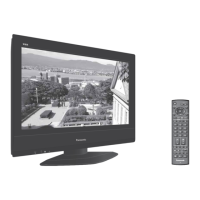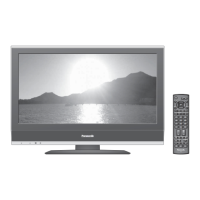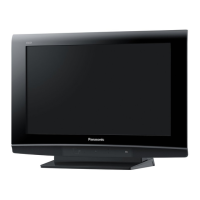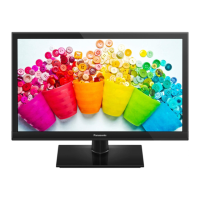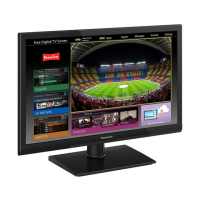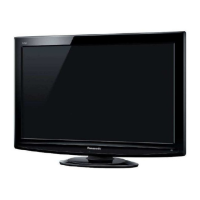Do you have a question about the Panasonic VIERA TX-26LXD6 and is the answer not in the manual?
Explains the differences between analogue and digital TV transmission, including DVB technology.
Covers high voltage, electrical safety, ventilation, and avoiding direct sunlight.
Guidelines for cleaning the TV cabinet and LCD panel safely.
Step-by-step instructions for replacing the fuse in the mains plug.
Instructions for inserting batteries into the remote control transmitter.
Guidance on optimal TV placement for viewing and component longevity.
Information on connecting external AV devices and using shielded cables.
Instructions on how to adjust the TV stand to different viewing angles.
Methods for cleaning the TV cabinet and LCD panel, with cautions.
Covers power, standby, input selection, volume, mute, and normalize buttons.
Explains the use of MENU, GUIDE, cursor, OK, and EXIT buttons for navigation.
Details buttons for aspect ratio, function select, and tuning mode.
Outlines initial connection choices using RF or SCART/RF cables.
Diagrams for connecting TV with VCR/DVD and satellite receiver via SCART/RF.
Guide to the auto setup process for tuning DVB and Analogue stations.
Feature to set a security code and personal details for owner identification.
How to view the station list and navigate using cursor and page buttons.
Steps to select a programme and clear the guide display.
How to access EPG, switch display styles, and navigate by day/category.
Viewing detailed programme info and setting up timer recordings from EPG.
Navigating between current and next programme info in the DVB banner.
Instructions for enabling or disabling subtitles for DVB programmes.
How to cycle through and select different picture aspect ratios using the ASPECT button.
Explanation of the Auto Aspect feature for optimal picture filling.
Important notes regarding aspect ratio settings and VCR playback issues.
Description of how the 16:9 aspect ratio displays images.
Description of how the 14:9 aspect ratio displays images.
Description of how the 4:3 aspect ratio displays images.
Description of how the Zoom1 aspect ratio displays images.
Description of how the Zoom2 aspect ratio displays images.
Description of how the Zoom3 aspect ratio displays images.
Explains how to navigate OSD menus using Menu Title, Sub-menus, and Instructions.
How to access the Picture, Sound, and Setup menus via the OSD.
Details the Last Position Memory feature for retaining settings.
Allows selection of preset picture modes like Dynamic, Normal, Cinema, and Auto.
Adjusts Contrast, Brightness, Colour, and Sharpness for optimal picture.
Adjusts overall colour tone and reduces picture noise with P-NR.
Adjusts Bass, Treble, and Balance for desired sound output.
Controls headphone volume, NICAM, and sound modes like Music or Speech.
Selects the audio input type for HDMI1 (Auto, Digital, Analogue).
Settings for Q-Link, HDMI control, and AV output options.
Configures Off timer, power preference, and AV volume correction.
Access to analogue tuning, DVB setup, Owner ID, and shipping condition.
Allows moving, adding, deleting, naming, or locking analogue stations.
Guides for automatically retuning or manually tuning analogue channels.
Step-by-step instructions for removing an unwanted programme from the list.
Procedure for adding a new programme to the channel list.
Instructions for relocating and renaming stored programme positions.
How to lock a channel to prevent unauthorized access.
Steps to copy channel data to a VCR or DVD/R via AV1 or AV2.
Guide to auto setup, including data loss warnings and restart procedures.
Steps to select a programme position and start manual tuning.
Specific note for tuning VCR signals using an RF cable.
Details button presses for accessing tuning mode, search, and storing stations.
How to re-access or alter Owner ID information via the Setup menu.
Procedure to enter PIN, Name, House Number, and Postcode.
Explains the function and process of resetting the TV to its original condition.
Access to timer programming for recordings and profile editing for favourite channels.
Options for locking channels and managing DVB tuning features.
Access to specialised DVB system settings and multi-audio selection.
Prerequisites for recording DVB programmes with external devices.
Step-by-step guide to setting up timer programs for DVB recordings.
Notes on deleting, editing, and managing timer recordings and reminders.
Options for setting daily or weekly recording schedules for DVB programs.
Information about encrypted DVB programs and the need for a CI module.
Instructions for selecting and adding favourite channels to a profile list.
Options to edit, rename, move, or delete channels within a profile.
Explains the function of Child Lock and notes on PIN number persistence.
Steps to lock or unlock individual channels and all channels using the service list.
Procedure for changing the 4-digit PIN used for Child Lock.
Guides the automatic retuning of the TV for DVB stations.
Allows adding new DVB stations while retaining existing channel data.
Displays signal quality and strength for DVB programmes for troubleshooting.
Provides access to functions contained on an inserted Common Interface Module.
Allows selection of the language for subtitles displayed via the STTL button.
Settings for downloading new software and controlling information banner timeout.
Key notes on switching off the TV, installing software updates, and handling modules.
Step-by-step guide for inserting a CI module and accessing its functions.
Enables automatic search and installation of new software overnight in standby mode.
Allows manual checking and downloading of new software versions.
Access to information regarding the television's software license.
Explains Q-Link requirements for VCR/DVD communication via SCART.
Details the Preset Download feature for transferring program order to recording devices.
Allows immediate recording of the current programme using the connected device.
Covers Auto Power On/Standby and Image View On for integrated devices.
Describes Standby, VCR/DVD switch, Play, and Stop functions.
Covers Skip/Fast Forward, Skip/Rewind, and Pause/Still operations.
Explains Programme Up/Down and Record button functions.
Explains the LIST and FASTEXT modes for accessing Teletext information.
Methods for selecting pages, controlling display (Full/Top/Bottom), and revealing text.
Instructions for storing custom page numbers in LIST mode for analogue stations.
Features for managing Teletext updates, news flashes, and display cancellation.
Procedure for accessing sub pages when Teletext information spans multiple pages.
Enables viewing TV picture and Teletext page side-by-side.
Explains DVB teletext differences and on-screen command navigation.
Introduction to connecting external AV devices and viewing the input source.
How to select AV inputs and notes on automatic switching and menu limitations.
Details AV terminals and the headphone connection specifications.
Identifies and lists the types of rear and side connection sockets on the TV.
Step-by-step guide for connecting component video and audio inputs.
Important notes regarding component input and signal compatibility.
Enables HDMI Inter-Operability for easy playback, power on/off linking.
Table summarizing control functions available across different HDMI connections.
Instructions for connecting devices with DVI output using an adapter cable.
Important notes on HDMI input terminals, signal types, and cable usage.
Table detailing aspect ratio signal compatibility across various input types.
Table showing signal compatibility and frequency for Component and HDMI inputs.
Detailed pinout diagrams for AV1 and AV2 SCART terminals.
Pinout diagram for the HDMI terminal, detailing signal assignments.
Common picture and sound problems with corresponding checks and solutions.
Troubleshooting for problems related to HDMI connections and DVB reception.
Solutions for general issues like no picture, no sound, or remote control problems.
Troubleshooting steps when no DVB channels are found after auto setup.
Diagnosing and resolving blocky interference or picture freezing in DVB.
Solutions for not receiving DVB stations despite a good aerial system.
Answers to common questions regarding screen display and sound output issues.
Answers to frequently asked questions related to HDMI connections and DVB reception.
Answers to other common issues like standby mode or remote control malfunctions.
Meanings for messages like 'All tuning data will be erased' and 'Warning! Selecting Auto Setup'.
Meanings for messages concerning recording status, downloads, and signal quality.
Meanings for messages about locked channels, unavailable features, and incorrect PINs.
Meanings for messages about checking aerial, service availability, and no stations found.
Meanings for messages related to recording status and software update failures.
Meanings for timer expiry, incorrect settings, and tuning data erasure warnings.
Guidance on troubleshooting before requesting service from a dealer.
Technical details on power source, consumption, LCD panel, and audio output.
Specifications for receiving systems, aerial input, and rear/side connections.
Technical details on TV dimensions (with and without stand) and weight.
Contact information for customer support services in the UK and Ireland.
Information on ordering accessories and products directly from Panasonic UK.
Guidance on the proper disposal of electronic waste for households and businesses.
| Screen Size | 26 inches |
|---|---|
| Resolution | 1366 x 768 pixels |
| Display Type | LCD |
| Aspect Ratio | 16:9 |
| Contrast Ratio | 1000:1 |
| Brightness | 500 cd/m² |
| HDMI Ports | 2 |
| Component Video Inputs | 1 |
| Composite Video Inputs | 1 |
| HD Format | 720p |
| Response Time | 8 ms |
| Viewing Angle | 178 degrees |
| VGA Port | 1 |
| Scart Sockets | 2 |
| S-Video Input | 1 |
| Digital Tuner | Yes |
| Analog Tuner | Yes |
| Sound Output | Stereo |
| Audio Output | 20W |
